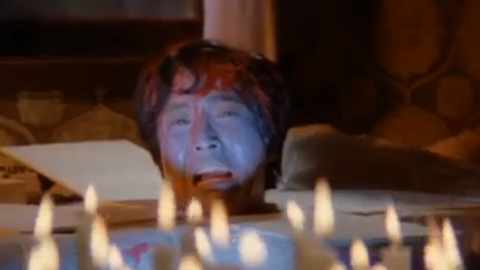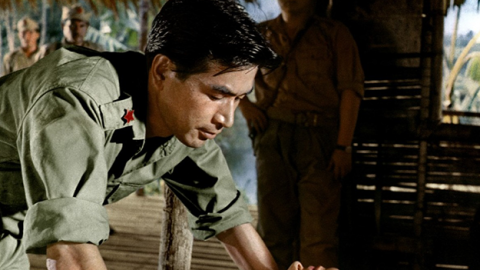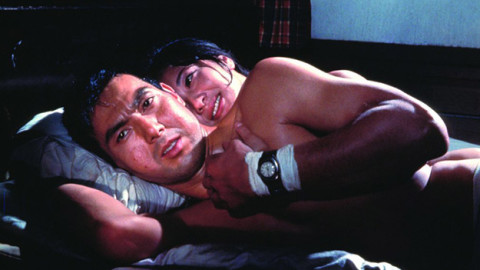Kaiju Shakedown: Hidden Criterion
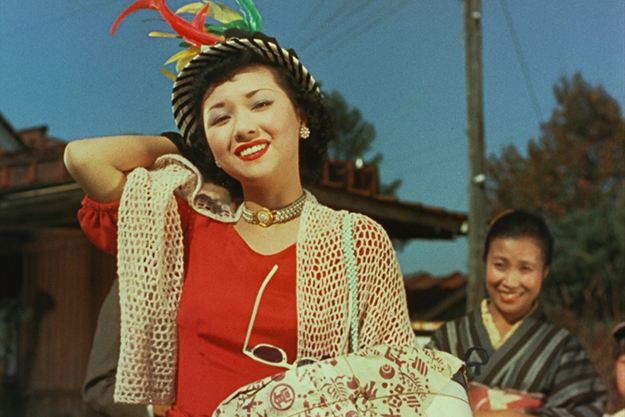
Carmen Comes Home
For streaming services, niche is the next big thing. After you get past Netflix and Amazon’s all-you-can-eat buffets of odds and ends, there’s Shudder for horror fans, Exploitation.tv for grind-house junkies, and Warner Archive Instant for B-picture and studio rarities. But if you’re a movie lover, there’s only one choice that’s essential: Hulu.
Thanks to a 2011 deal, the Criterion Collection is streaming 900 of its titles on Hulu, most of them in gorgeous transfers with posh (read: grammatically correct) subtitles. If you’re a fan of Japanese cinema, it’s like someone has suddenly offered you the crown jewels of the canon for a couple of bucks a month. Criterion’s catalogue has plenty of shortcomings, most notably that it ignores every single Asian film industry except Japan. Equally frustrating, they’ve let many of their Japanese titles go out of print on DVD—or acquired titles and never even released them on DVD. Now they’ve decided to dump everything they’ve got stacked in the warehouse onto Hulu, which means that dozens and dozens of previously unavailable Japanese films are presented here in all their glory.
Keisuke Kinoshita has long been considered one of Japan’s best mid-century directors, but to judge by his eight films on Criterion Collection DVD he mostly made family melodramas. Turn your attention to the staggering 42 Kinoshita films streaming on Hulu and you realize that he made comedies (Here’s to the Young Lady, 49), satires (Carmen Comes Home, 52; Danger Stalks Near, 57), ghost stories (Yotsuya Kaidan Pts. 1 & 2, 49), anti-war sagas (The River Fuefuki, 60), and rural revenge dramas (A Legend Or Was It?, 63).
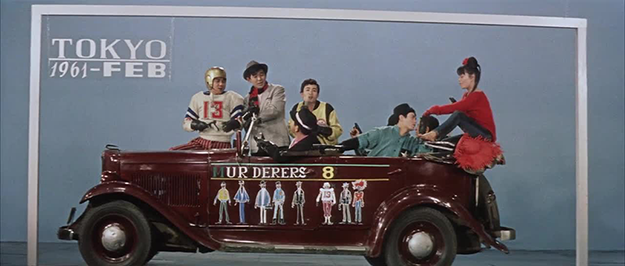
Killers on Parade
Criterion only has three DVDs from New Wave director Masahiro Shinoda available, and while Pale Flower (64) and Double Suicide (69) are widely considered his best two films, head over to Hulu to taste the rainbow with 19 of his titles, like his style-overdrive Kabuki freak-out The Scandalous Adventures of Buraikan (70), his cartoony action movie Killers on Parade (61), his 1971 adaptation of Silence (from the award-winning novel by Shusaku Endo that Martin Scorsese is currently remaking), his tense anti-samurai movie Gonza the Spearman (86), or his complicated and spiky historical film Assassin (64).
Hulu is a repository for everything that Criterion would never put on DVD, from Ironfinger (65) and Golden Eyes (68), two very strange James Bond knock-offs that feel like they were made by and for small children, to deep catalogue cuts from international masters like Nagisa Oshima (Criterion DVD = 8 movies; Hulu = 16). If you only know Nobuhiko Obayashi from his experimental haunted mansion movie, House (77), you owe it to yourself to check out his experimental true crime castration movie, Sada (98), or his ultra-experimental gothic short film Emotion (66), both of which are streaming. (To be fair, Emotion is included as a supplement on the House DVD but at 40 minutes it’s a nice stand-alone film.)
Horror auteur Kiyoshi Kurosawa’s breakthrough movie, Cure (97), has long been out-of-print on DVD, but it popped up recently on Hulu, and while Criterion has never seen fit to issue a DVD of Seijun Suzuki’s Sun Tribe movie Everything Goes Wrong (60), it’s as narratively and visually compelling as anything he ever made, and it’s streaming. Shohei Imamura is one of Japan’s rowdiest and most raucous directors, launching experimental movies at the screen like RPGs, and sure enough his Wicker Man-by-way-of-Okinawa film, Profound Desire of the Gods (68), is only available streaming. But two of his earliest films, Endless Desire (58) and Stolen Desire (58), are here, too, and while they’re missing that avant-garde edge, they’re still exceptional. Stolen Desire was his first film, about a group of actors who pass through a small town, disrupting everything in their path and luring locals away from home with the siren call of the glamorous stage, the smell of sex, and life on the road. Endless Desire is Imamura’s third film, a razor-sharp noir about five men who gather to dig up a barrel of buried morphine 10 years after the end of World War II. Quickly veering from film noir to black comedy to horror and back again, if the Coen Brothers were ever looking to remake a Japanese movie, this is it.
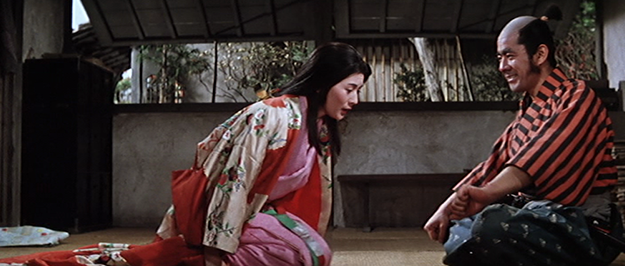
Samurai Saga
If you love Toshiro Mifune, you have to see Samurai Saga (59), arguably the best adaptation of Edmond Rostand’s Cyrano de Bergerac ever filmed. Shot in eye-searing Technicolor, the story of the ace swordsman who can never know true love because of his enormous schnoz has never been better. The swordplay is excellent, and as Mifune breathes his last in a flurry of cherry blossoms, abandoned by everyone except his one true friend, his performance erases Gerard Depardieu’s over-ripe, cheesy Gallic version and Jose Ferrer’s persnickety Cyrano from memory.
But probably the greatest Criterion movies awaiting rediscovery on Hulu are the crime films of Yoshitaro Nomura and the big-dicked samurai movies of Hanzo the Razor. Created by Kazuo Koike (the mangaka responsible for Lone Wolf & Cub, Lady Snowblood, and Crying Freeman) and midwifed by Shintaro Katsu (star of the Zatoichi series) Hanzo the Razor is Japan’s answer to Dirty Harry, Shaft, and James Bond. One of the many macho rule-breaking lovers and fighters who appeared in the early Seventies, Hanzo manages to wallow in the genre while simultaneously satirizing it.
Set in the Edo Era, Hanzo (Shintaro Katsu) is a police investigator who submits himself to torture in order to better understand it and fights corrupt officials (fellow cops in Sword of Justice, 72; Buddhist priests in The Snare, 73; and treasury officials in Who’s Got the Gold? 74). Gifted with his own theme song and an enormous penis, which he strengthens by beating with a wooden bat and violently screwing a bale of uncooked rice, he impales resistant suspects on his donkey dong until they confess. Think Lone Wolf and Cock.
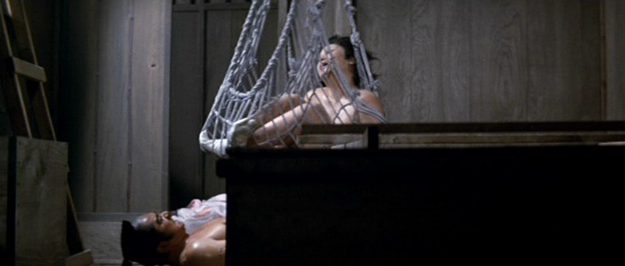
Who’s Got the Gold?
There aren’t any big action scenes in the Hanzo series, just one hilariously overwrought, macho moment after another, with Hanzo screwing suspects into submission, then soaking in his hot tub with some sake, fighting evil while super-rocking slow jams of the sexy Seventies work the soundtrack. It could be offensive, but all three movies are so ridiculous, exploitative, juvenile, and delivered with such po-faced retrograde machismo that even the most easily appalled viewer can’t take it seriously.
Eschewing preposterous penises for pensive poetry, Yoshitaro Nomura made mostly crime films between 1952 and 1985, and his style places him somewhere between an Anthony Mann and an Alfred Hitchcock. Unavailable on DVD, five of his best movies are streaming and they’re all worthwhile. Deeply concerned with place and atmosphere, Nomura’s Stakeout (58) follows two cops from Tokyo to Kushu Island in the middle of a sweaty summer heat wave to keep an eye on Sadako, a respectable housewife whose former lover is suspected of murder. Thinking he might look her up for help, they settle in for a long wait, and learn that her perfect small-town life is actually Hell on earth. Her children are jerks, her husband is emotionally abusive, and soon they feel nothing but pity for her, even as her murderous sweetheart gets closer and closer.
Zero Focus (61) is a thriller about a newlywed whose husband has a double life; in The Shadow Within (70), a salaryman meets a woman whose kid may resent mommy’s new friend to a homicidal extent; and Castle of Sand (74) features Tetsuro Tamba as a poetry-writing cop investigating the murder of an unidentified old man found in a railyard. Unfolding with dry precision (occasional title cards read, “Waiting for the Kisuki Line Train bound for Bingo-Ochai”) it ends in a bravura, 50-minute setpiece that cuts between Tamba’s outlining of the facts (as he petitions for an arrest warrant), re-enactments of the suspect’s childhood, and his debut of a new symphony, a powerful sequence that manages to evoke sympathy for the whole human race, without once asking for it outright.
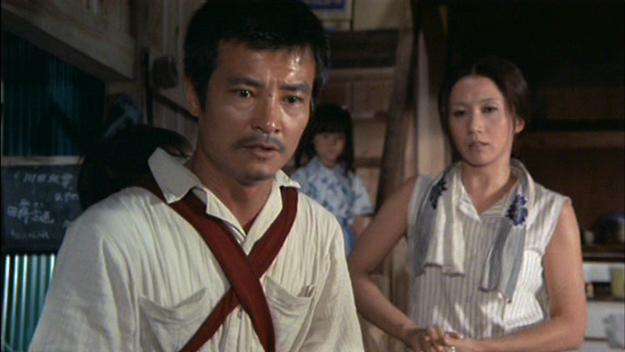
The Demon
However, it’s Nomura’s The Demon (78) that leaves you gutted. Sweeping all of Japan’s major film awards for “Best Actor” and “Best Director” the year it came out, the film focuses on Sokichi (award-winner Ken Ogata), a dimwitted printer who’s barely clinging to financial solvency when his mistress shows up at his front door and drops off the three children he’s fathered by her. I don’t want to spoil what follows but it’s got all the sweaty urgency of a Jim Thompson novel, the “I didn’t just see that” creepiness of the grimmest horror movie, and a sting in its tail that will draw tears from even the stoniest viewer. Filmed in a deceptively simple style, this is one of the most intense movies I’ve ever seen, and one wishes it was available to everyone on Blu-ray, rather than tucked away in the depths of Hulu. But maybe browsing the dusty electronic aisles of Hulu, with its balky search function, and stumbling across these gems is the perfect way to rediscover them, a re-creation of the way we used to find a film on the back shelves of a video store, press it to our chests, and think, “Mine.”
LINKS! LINKS! LINKS!
… Want more Nobuhiko Obayashi than just Sada or his short film Emotion? Then head over to Japan Society in New York, where they’re holding a 10-film retrospective with the director present. If you’ve seen Obayashi’s House, then understand that that’s the mere tip of the iceberg. There’s so much more in his filmography, and all of it is just as strange.
… Speaking of strange, remember Miracle Fighters (82), the Yuen Clan movie that featured a talking fish getting deep-fried to death, giant fighting marionettes, and a jar monster among other grotesqueries? Now, the Yuen Clan’s most famous brother, Yuen Wo-ping, is directing a remake that shares that title and spirit, but not the plot. Writing the script and producing is Tsui Hark via Film Workshop. Shooting is set to begin after Chinese New Year 2017.
… The other big Japanese retrospective that has been popping up all over the place is the massive Seijun Suzuki retro currently in progress at Lincoln Center and the Smithsonian. Marc Walkow provides an overview and makes the case that Seijun Suzuki is simultaneously the most over- and under-rated director in Japan.
… On Halloween, Park Chan-Wook (Oldboy) wrapped production on his new movie, officially titled The Handmaid, after a nearly five-month shoot in Japan and Korea. Based on Sarah Waters’s novel, Fingersmith, it’s set during the Japanese Occupation and centers on a pickpocket posing as the handmaid of a wealthy family. Not sure if the title’s resemblance to Korean director Kim Ki-Young’s classic film, The Housemaid, is accidental or on purpose.
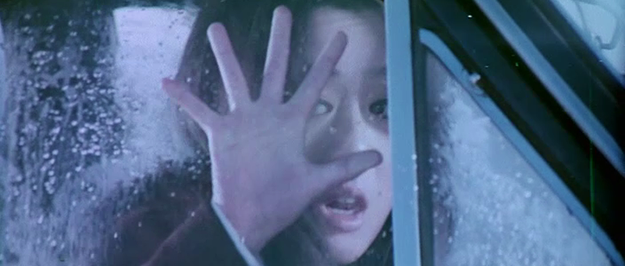
Insect Woman
… In other Kim Ki-Young news, if you want to watch his movie Insect Woman, the Korean Movie Database is streaming it, along with 420 other classic Korean movies, for free on its app during the month of November.
… Gokseong—the new film from Na Hong-Jin, director of The Chaser, the thriller that almost single-handedly saved the Korean film industry back in 2008—was just picked up by sales company Finecut in Korea. Based on a crime in a rural village, Gokseong at one point had Takeshi Kitano rumored to co-star, but the cast now consists of Hwang Jung-Min (The Unjust, Veteran), Kwak Do-Won (The Yellow Sea), and longtime Japanese character actor Jun Kunimura (Audition, The World of Kanako).
… The Japanese film industry is in a weird place these days where it’s very strong at home but, a bit like Thailand, is getting almost no traction with overseas audiences. At the recent Tokyo International Film Festival, sales agent and distributor Adam Torel, sales agent Takamatsu Miyuki, and Nagai Nobuhiro of the Cool Japan Fund sat down and talked about this. Actually, I shouldn’t say “talked.” Basically, Torel and Takamatsu rip Japanese business practices a new butthole and make fun of the Cool Japan Fund for being a useless bunch of old men with a stupid trendy name picked out of a hat, while Nagai Nobuhiro repeats “I’m relevant, please, I promise, I really am…” over and over again while crying. It’s essential reading.

… They’re getting the band back together! After a cameo appearance in the Chinese superhero movie Jian Bing Man, Ekin Cheng and the cast of the legendary Young & Dangerous movies are looking at scripts and considering a reunion. Hung Hing Boys for the win!
… Hollywood is in China, and they’re producing remakes and movies that sound boring! Village Roadshow Pictures Asia has tapped Larry Yang (Mountain Cry) to direct a Chinese remake of the Halle Berry thriller The Call about a 911 operator. They’re also producing a biopic about Stephon Marbury, an American basketball player for the Beijing Ducks, that will star Marbury himself.
… Rosamund Kwan, the Hong Kong star best known for playing Aunt 13 in the Once Upon a Time in China series, as well as starring in dozens of other classic Hong Kong flicks, recently announced that she was both married and divorced all at the same time. She’s made a killing in real estate since leaving show business, but at a recent event she said she actually wasn’t dating billionaire Pierre Chen…they were getting divorced! Then she pointed to some paparazzi pictures of actress Carina Lau hiking with Chen and said: “They’re not children. They’re adults. They don’t consider other people’s feelings.” Shock waves were felt around the planet because Carina (Infernal Affairs 2, among many other movies) is married to Tony Leung Chiu-wai (In the Mood for Love) and keeps claiming their marriage is strong despite rumors of a divorce last year. What is happening to the world?!?!?



